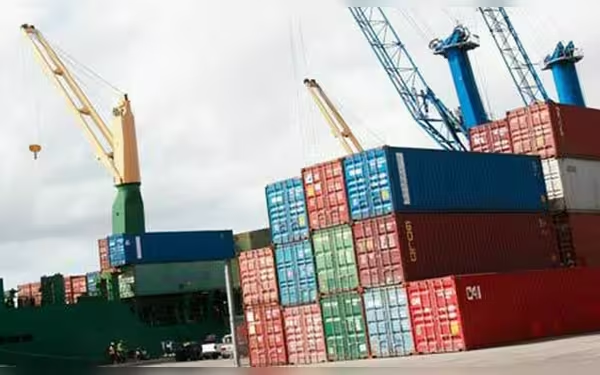Saturday, November 16, 2024 08:44 PM
Pakistan's Trade Deficit with SCO States Surges 41 Percent
- Trade deficit with SCO countries reaches $11.703 billion.
- Imports from China account for 91.38 percent of total imports.
- Exports to Kazakhstan increase by 92.35 percent.
 Image Credits: dawn
Image Credits: dawnPakistan's trade deficit with SCO states widens by 41%, reaching $11.703 billion, driven by soaring imports, particularly from China.
Pakistan's trade dynamics have taken a significant turn, particularly concerning its relationships with the nine member states of the Shanghai Cooperation Organisation (SCO). The trade deficit with these countries has widened by over 41 percent, reaching a staggering $11.703 billion in the fiscal year 2024 (FY24), compared to $8.298 billion in the previous fiscal year. This increase is primarily attributed to a sharp rise in imports from major trading partners such as China, Russia, and India.
As the heads of state from SCO nations convene in Islamabad for the 25th summit, the focus is on enhancing multilateral cooperation among member states. Key topics on the agenda include combating terrorism, fostering economic collaboration, and addressing climate change. While Pakistan's exports to SCO countries, particularly China, have seen notable growth, the overall export performance to other member states has been less favorable.
According to data compiled by the State Bank of Pakistan, the value of exports to the nine SCO countries—including China, India, Iran, Kazakhstan, Kyrgyzstan, Russia, Tajikistan, Uzbekistan, and Belarus—rose by 32.4 percent, amounting to $3.076 billion in FY24, up from $2.323 billion in FY23. However, this positive trend is overshadowed by a significant surge in imports, which increased by 39.14 percent to $14.779 billion in FY24 from $10.621 billion in the previous year. This stark contrast highlights a growing trade deficit with most of these countries.
Imports from China, which dominate the trade landscape, surged by 39.78 percent, reaching $13.506 billion in FY24, compared to $9.662 billion in the same period last year. Notably, imports from China accounted for a staggering 91.38 percent of total imports from SCO countries. On the other hand, Pakistan's exports to China also saw a commendable rise of 33.68 percent, totaling $2.707 billion in FY24, up from $2.025 billion in FY23.
Trade with Russia presents a mixed picture. While imports from Russia increased by 36.58 percent to $1.011 billion in FY24, exports to Russia fell by 10.89 percent, dropping to $78.91 million from $88.56 million in the previous year. Similarly, imports from India rose by 8.866 percent to $206.89 million, while exports to India saw a remarkable increase, climbing to $3.669 million from just $0.329 million in FY23.
Among Central Asian states, Kazakhstan emerged as a significant player, with exports from Pakistan reaching $183.16 million in FY24, a remarkable 92.35 percent increase from $95.22 million in FY23. Conversely, imports from Kazakhstan plummeted by 84.55 percent, indicating a shift in trade patterns. Kyrgyzstan's trade remained relatively stable, with exports slightly declining and imports doubling.
Trade with Tajikistan has also evolved, with imports rising by 65.67 percent to $6.13 million, while exports fell by 37.38 percent. The two countries have signed a transit trade agreement, allowing Tajikistan to import goods through Pakistani seaports, which could potentially enhance trade in the future. Meanwhile, Uzbekistan has implemented its transit trade agreement with Pakistan, facilitating the import of 1,200 containers in February.
In contrast, trade with Belarus showed a significant increase in imports, which reached $27.64 million in FY24, compared to $5.60 million in FY23. However, exports to Belarus decreased slightly. Trade with Iran remains largely barter-based, and official data is scarce, making it challenging to assess the full potential of this trade relationship.
While Pakistan's exports to SCO countries have shown some positive growth, the overall trade deficit continues to widen, primarily due to soaring imports. This situation calls for a strategic reassessment of trade policies to enhance export performance and reduce reliance on imports. As the SCO summit unfolds, it presents an opportunity for Pakistan to engage with its partners and explore avenues for more balanced trade relationships, ultimately benefiting its economy.













